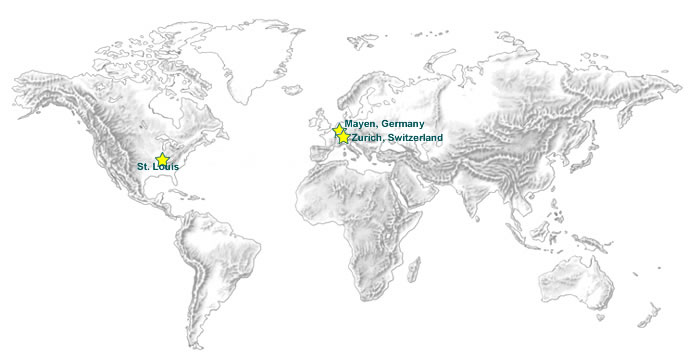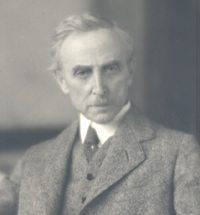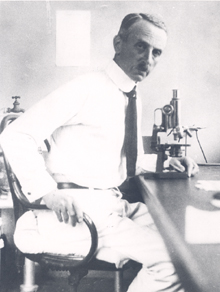Leo Loeb (1869-1959)
Leo Loeb is remembered as one of the giants of early twentieth century research pathology. He was born in 1869 in Mayen, a small city of the Rhineland province of Prussia in Germany. His parents died when he was a young child. Sent to live with an uncle in Berlin, various minor ailments caused him to be diagnosed “sickly” and unsuited to city life. Loeb was sent thereafter to various schools in German spa towns. He commenced university-level studies at Heidelberg with the intention of becoming a scientist, but remained undecided for some time with respect to concentration. Loeb attended only one semester at Heidelberg (1888 or 1889), followed by stays of no more than that length at universities of Berlin, Freiburg, and Basel. Clearer in his mind was the desire to evade the bellicose nationalism characterizing German politics of the time. Having chosen to become a physician, he entered the University of Zurich in 1890. He interrupted that curriculum for two short visits to the United States separated by a year in Edinburgh and a clinical clerkship in London (1892-1895), but returned to finish at Zurich in 1897.
A Swiss M.D. required a thesis, for which Loeb conducted experiments in skin cell transplantation using guinea pigs. The results encouraged him to seek a career in research for himself. An influential model was his older brother, Jacques Loeb (1859-1924), who in 1897 taught at University of Chicago. Jacques Loeb epitomized the view that all life could be explained in terms of physiological and biochemical processes. Leo moved to Chicago and prepared for the Illinois medical practice examination. Once he passed, he saw patients as an interim means to fund his private research laboratory near his residence. Within a year he was invited to lecture both at University of Illinois College of Physicians and Surgeons and at an experimental school directed by John Dewey at University of Chicago. Loeb summarily abandoned clinical practice. He remained in Chicago until 1902 and resumed his investigations into cell transplantation. He was in these years also a visiting scholar at Johns Hopkins University. His research branched into research on blood clotting and the properties of certain cancer cells. From many of his findings he developed the realization that cell cultures could be sustained in vitro – a landmark concept for all contemporary clinical research. As Loeb himself phrased it in a memoir, “normal adult tissue cells may be potentially immortal.”
In 1902 Loeb was recruited by McGill University in Montreal; he stayed a year, but found the following winter in Quebec miserably cold and moved on to University of Pennsylvania in Philadelphia. There he began a series of important investigations into connections between cancer and reproductive hormones. In 1907 he published observations that mammary gland cancer in mice could be hereditary. Demonstrating his versatility in sometimes startling ways, he was the major author of a study of the venom of Heloderma, a genus of lizards including the Gila monster. A growing reputation led to Loeb’s being invited to become research director at Barnard Free Skin and Cancer Hospital in St. Louis in 1910 – a hospital with research as its primary objective was still a relative rarity in those times. Loeb organized the laboratories of a new building for the hospital. His major finding of his years at Barnard demonstrated that cancer in test animals could be retarded by the removal of ovaries.
In 1915 Loeb was named professor of comparative pathology at Washington University Medical School. Washington University was his institutional home from then on. In 1922 – at the age of 53 – he married Georgia Sands, a physician whom he had known for several years. As Georgia Sands Loeb, she contributed immensely to her husband’s intellectual and administrative duties, among other capacities, assisting with editing his papers and books. He became head of the University’s pathology department in 1924, a position he retained until retirement in 1937 (when he became professor emeritus). Loeb continued to develop techniques for sustained in vitro tissue culture and for transplantation of tissue. He pioneered investigations of possible viral causes of cancer, in the process refuting traditional theories that cancer might be contagious. Loeb’s research extended into other areas as well, making important discoveries about the functions of the pituitary gland and the nature of Grave’s disease. Throughout his time at Washington University, as from his youngest days, Loeb assiduously promoted the work of younger scientists whom he mentored and worked with in his laboratories.
Loeb curtailed his active laboratory research after 1941, but has long as he lived he analyzed and wrote about his discoveries and their wider meanings. His scientific summa is the monograph The Biological Basis of Individuality (1945). This book covers much of the ground of his entire career, from genetic factors in facilitating or blocking tissue implants to human psychological issues defining individuality in the social sphere. From this point onward Loeb devoted much of his time to consideration of what he called “psychical goods” (as opposed to material goods) of human life. He planned to write a book on the subject, but was not able to complete it due to illness in his later years. His “Autobiographical Notes,” published as an article in 1958, the year before his death, sketches out some of the ideas he was working on. Loeb conceptualized three levels of human thought – vaguely analogous, but without specific reference to Freudian models – the lowest being “hypnosuggestion,” above it “reasoning thought,” and at the highest level the “wider, deeper thoughts and interests represented by certain problems of philosophy and science.”
Upon his death late in 1959, Loeb was remembered as a gentle soul with an aversion to competition so strong as to avoid card games and golf (his favorite recreation was horseback riding). One of his former students, the head of internal medicine Carl V. Moore, recalled that Loeb spoke on the meaning of life and death in a manner conveying “we were in the presence of a scientific philosopher as well as one of the world’s leading biological scientists.”

Related Resources:
Back to Biographies


